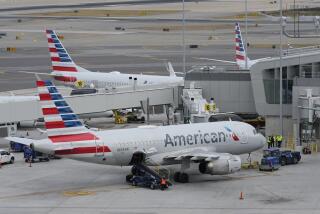Newsletter: Airline fees cost passengers over $35 billion a year
Welcome to the weekly newsletter of the L.A. Times Business Section. I’m consumer columnist David Lazarus, here today with a look at how much airlines are profiting from all those add-on fees.
Short answer: lots.
A report on carriers’ “ancillary revenue” from IdeaWorks shows that 154 global airlines pocketed more than $35 billion last year from fees related to frequent-flier programs, which are their biggest cash cows, as well as baggage, extra legroom, snacks and other ways passengers are routinely clipped for what were once free amenities.
Here are the top four, based on the airlines’ financial filings:
- American: $7.2 billion
- United: $5.8 billion
- Delta: $5.6 billion
- Southwest: $4 billion
The report doesn’t break out revenue from add-on fees without frequent-flier programs in the mix, which would be a lower number, probably closer to $5 billion a year.
But it notes that American gets about $35 per passenger from ancillary revenue, United about $36, Delta $29 and Southwest $30.
“The arrival of basic economy fares has opened the door for traditional airlines to experiment with an ever-expanding list of a-la-carte fees,” the report says. “These are indeed interesting times with unexpected outcomes.”
It’s understandable why ancillary revenue for airlines is soaring. Carriers know full well that ticket prices are by far the most important consideration for passengers, so the airlines bend over backward to give the impression their fares are lowest.
But this a misleading and, to my mind, deceptive business practice.
It’s also something that isn’t unique to the airline industry. Wireless service providers, cable companies, hotels, restaurants and others now routinely tack on added fees for services that once were part of normal prices.
The racket here is to create a distinction between “base prices” and surcharges — and making those surcharges look like they’re required by the government when they’re actually just normal business expenses.
Here’s an example: AT&T more than doubled its monthly “administrative fee” last year to $1.99 from 76 cents. An administrative fee sounds sufficiently official that many customers might not give it a second thought.
In fact, the fee “helps cover costs we incur for items like cell site maintenance and interconnection between carriers,” AT&T has acknowledged, which means it basically covers some of the routine costs of operating a wireless network. Perhaps the company figured people wouldn’t notice its $800-million revenue increase if it wasn’t part of the base price.
Enough already. As I’ve written in my column, it’s time that all taxes and fees be included in the prices of products and services. This is largely how it’s done in the European Union, and it has the simultaneous benefits of allowing consumers to accurately comparison shop and forcing businesses to compete head to head on pricing.
Go ahead, charge whatever you please. Just don’t try to trick people into thinking they’re paying less than they are.
Now then, here are some upcoming events and recent stories that caught my eye:
STORY LINES:
Climate and commerce: Over the years, Amazon has faced scrutiny for its impact on small businesses, conditions in its warehouses and issues of counterfeiting on its marketplace. But only in the last few months has the e-commerce giant taken heat for its environmental toll. What changed?
Spring is here: The transformation of Spring Street in downtown Los Angeles’ Historic Core continues apace. After businesses fled the city’s financial center, hard times fell on Spring Street. But a wave of redevelopment has swept through the area, coming now to the Trust Building — an Art Deco-style tower that had been mostly vacant for two decades.
Cost of housing: Airbnb became the latest firm to pledge money to fight a housing crisis that can be blamed in part on the technology industry. The short-term rental company last week said it would steer $25 million toward housing efforts in Los Angeles County and the San Francisco Bay Area. By one measure used to gauge the cost of constructing affordable housing in California, that money could be enough to build 76 new homes.
WHAT WE’RE READING:
Detective Fitbit: Wearable health gadgets like Fitbits record your heartbeat. That can be very useful when investigating a murder, Wired reports.
The undercovered: A consequence of the Trump administration’s efforts to undercut the Affordable Care Act? Americans relying on short-term health insurance coverage, which might leave them on the hook for huge bills as high as $244,447.91 for one family, Bloomberg Businessweek reports.
Let me know what you think of the newsletter. My email is david.lazarus@latimes.com, or you can find me on Twitter @Davidlaz. Also, tell all your social media pals to join the party.
Until next time, see you in the Business section.







